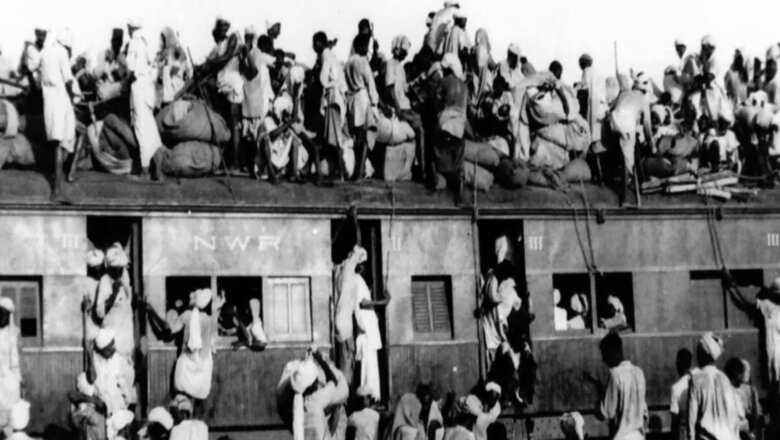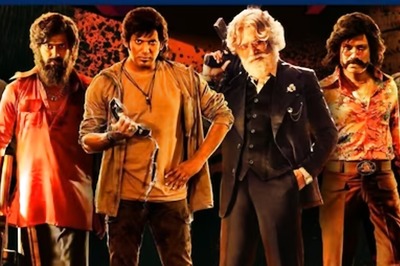
views
“Untold stories” are the flavour of the season. From occupying space across over-the-top (OTT) media platforms to spreading across large screens, the sudden proliferation of period pieces and dramas with this inventive tagline appears to be the new strategy of the Rashtriya Swayamsevak Sangh (RSS), its affiliates, and likeminded intellectuals to repackage and “retell” India’s history. As a part of its “decolonisation” efforts, the Sangh has also been working on reaching out to people through cinema and literature to garner support on the socio-cultural front. For this, the RSS has created a “cinema ayam (division)”.
This wing is working closely with directors and producers to work on “nationalist” projects. In two years, before the centenary celebration of the RSS, at least 12 such “untold stories” will be released on OTT platforms and in theatres. The projects in the pipelines include “The Battle of Colachel”, which was fought in August 1741 between the Indian kingdom of Travancore and the Dutch East India Company. King Marthanda Varma defeated the Dutch forces. There will also be films on Veer Savarkar, India’s partition, and the Marichjhapi massacre in Bengal, News18 has learnt.
Every historical event has multiple renditions, and the RSS is trying to present the “Indic” or “Bharatiya” versions, which were suppressed by the Leftist-communist-Congress ecosystem, senior functionaries said. They added that the idea to present a series of “untold stories” through cinema and books is also about breaking the stereotypes of the Leftist notion of theorising history in a certain political way.
Ahead of its centenary year, the RSS is also making efforts to create ideologically aligned literature and cinema to counter the narrative that implies the Right wing is devoid of intellect and academia. The RSS wings Pragna Pravaha and Sanskar Bharti have already initiated annual conclaves like Bridging South, Lokmanthan (Colloquium of Nation First Thinkers and Practitioners), and several literature festivals to counter the “communist-Leftist” narratives and their litfests, said a senior member of the RSS central committee.
To understand such systemic change in the socio-cultural sphere in India’s cinema and literature, News18 spoke with senior members of the government, RSS, and academia. There are diverse and polarised views among them, as a section thinks that India’s history was “poisoned” by colonial powers, while another feels that the current renditions of history are just “mythification” of historical events.
India’s civilisational heritage ‘stripped’
In past years there were films and books, some with the tagline “untold stories of…”, that have occupied significant space in the literal and cinematic worlds. Historical events that were seen or read earlier now come repackaged. For example, films and shows like Emergency (yet to be released), The Railway Men: The Untold Story of Bhopal 1984, Samrat Prithviraj, The Tashkent Files: Who Killed Shastri, etc. Some contemporary stories have been packaged like The Vaccine War-A True Story, The Kerala Story-Uncovering The Truth That Was Kept Hidden, and more.
Speaking with News18, Kanchan Gupta, senior adviser, ministry of information and broadcasting, said, “The effort of history writers otherwise known as historians for long has been to deracinate the average Indian and strip India’s civilisational heritage of all glory. Mughal court historians evolved into European and British travellers and later European and British academics writing on India. After 1947, their role was taken over by Marxist historians. Government-sponsored history-writing by Leftist academics who crowded our institutions courtesy Nurul Hasan (former union education minister) was retrofitted to comply with politics and ‘state ideology’.”
What we saw in the process was sanitised history that robbed us of our cultural heritage and civilisational history, he said. “That phase is now over with multiple voices competing to tell the myriad stories of India — young voices, articulate voices, smart voices. I think the trend was started by Amish Tripathi and Ashwin Sanghi. Their popular books encouraged others to come forward and publishers to risk publishing new writers. This, coupled with the reassertion of cultural identity, has set the stage. Young India is not the old hand-wringing India. This point on heritage and history will be increasingly set free from the clutches of ‘historians’,” Gupta added.
‘Cinema captured by anti-national elements’
J Nandakumar, national convener of Pragna Pravaha, the knowledge think tank of the RSS, said that the film industry was slowly and systematically “captured” by “anti-national elements” and efforts that filmmakers like Dadasaheb Phalke made to popularise “nationalist” cinema started fading.
“The rulers always played such tricks in their colonies. It had happened in Africa, in India, and other colonies. The colonial masters always tried to destroy your stories. They always propagate the idea that these stories are based fundamental ideas, or these stories are just myths. Like ‘Puranas and Upanishads are all myths’. Our history has been poisoned this way, and our society has been demoralised. Without remembering our past, without knowing the indigenous version of the historical events, if we only keep reading and seeing the colonialist’s version, how can we feel proud about our land? So it is necessary to retell history in a holistic manner. There were people in our history who devoted their lives to the nation, for us. Without remembering them in a respectful way, a nation cannot go forward,” he said. “Our fight against the colonial power was never a single-phased one; it was always a multi-layer one. Apart from the political struggle, we also struggled in the literary field, we fought against the foreign invasion in the cultural field as well. So the untold or suppressed stories are now coming out through nationalist literary exercises.”
Nandakumar also cited instances from the pre-Independence era. “Dadasaheb Phalke made Raja Harishchandra, but what was the reason? He was a true nationalist and patriot. That is why Lokmanya Tilak invited him to the Bombay Provincial Congress Parishad, and he openly sought support from people in making such films. That might have been the first crowdsourcing to make such films. The money was sourced from patriotic Congress delegates to make the untold stories of the nationalist and patriotic icons of the country. He then made Lanka Dahan, which was immensely successful,” he said.
But that trend had gradually gone down, Nandakumar lamented. “The anti-national forces, the so-called Mumbai gang or D-company took over. They caught hold of the main film industry. Even after Independence, we saw films like Kismat coming up, and so many more. But slowly and systematically, the anti-national elements with support from abroad captured the space. They started creating so many films in which we were unable to see the true Bharat. Instead of Bharat, in the films that came out in the late 1980s and 90s, we could see London, Paris, Switzerland,” he said.
‘Mythification of history to suit a political narrative’
Even as a section has a positive sentiment and emotional attachment with this upcoming genre of “untold stories” in cinema and literature, there are senior academics who believe that many of these period pieces are just “mythification” or “fictionalisation” of historical events. They feel that some of these works are “exaggerated” and “political” in nature to suit an agenda.
“History or historical pieces should always have scientific research and rigour in them. History always goes into the scientific rigour of research that would require a lot of evidences. It would require historiography. We need to have such evidences that will stand all kinds of refutations and criticisms; so that is something called research in history, that is academic and also the truth. Because that goes through the rigour of truth, and the rest are fiction. The content on OTT platforms or the films and pieces on social media do not have that rigour,” said Tanvir Aeijaz, professor of political science at Delhi University. “We have seen that the directors and producers say that they consulted books. But which books, what are the page numbers, and which sources or references…that they never mention. Once you ask them about the methods and historiography, they fall flat. So at the end of the day, these are all fiction. Except for the research which has been done at the academic level and of a high standard, the rest are all either fiction or myth. They go far away from the truth. History writing is a serious exercise.”
It is primarily about creating a “political narrative” to win elections too, he said. “We all know that there always has been a political narrative. Political parties, in order to garner support to win an election or to become popular, always create a narrative that suits their vested interests. They would like to get support for that narrative from various sources. So if they don’t get such desired support from the existing folklores and folktales, they create new ones suiting their politics. They would dig into the past, they would try to read books that are not serious ones and they would try to change history. So this becomes mythifying history to suit their political narratives, which is very much exaggerated,” said Aeijaz.
He added that historians should also take responsibility towards making people understand history in simpler ways and in public spaces. “For example, they say that all Muslim rulers were cruel. It is an exaggeration. All rulers are cruel. This is not only symptomatic of India but all over the world,” he said. “This is also a weakness on the part of the historians because they were not able to bring this rigour in the public space in a simple way.”
Even though some academics link such content with electoral politics, a senior RSS functionary disagreed. “There is no link with politics. We need to present the sociocultural shift because the narrative was always dominated by the ecosystem which sided with the colonial masters,” he said. “We feel that a nation can only grow when it gets to read and learn about its original history. “

















Comments
0 comment